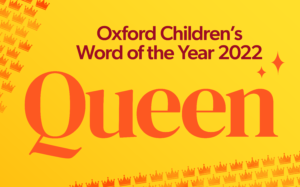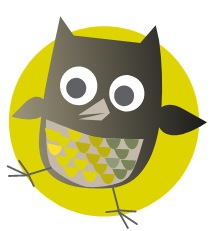Queen is the Oxford Children’s Word of the Year 2022.
Children express overwhelming sadness at loss of Queen but remain hopeful about year ahead
According to research conducted by Oxford University Press, Queen is the children’s word of the year for 2022. Almost half of children surveyed chose Queen as their word of the year, followed by over a third selecting happy and more than one in ten choosing chaos.
When asked why they chose Queen, many children talked about sadness and loss as well as feelings of pride in relation to the late monarch. Girls were more likely than boys to relate to the late Queen, and analysis of the Oxford Children’s Corpus, the largest children’s English language database in the world, revealed Queen Elizabeth was regularly in the top-ten list of famous people children have written about over the years.
The Research
In order to find the Children’s word of the year 2022 4,000 children aged 6-14 across the country were asked for their suggested word of 2022 and based on the most common responses and themes in their answers, three words were shortlisted:
- Queen
- happy
- chaos
The three words were then put to vote by a further 1,000 children to decide their overall word of 2022.
“It comes as no surprise that Queen is Children’s Word of the Year for 2022. This not only reflects Her Majesty’s 70 years of incredible service, but over the past decade our research consistently reveals how attuned children are to the news and the impact current affairs have on their language. It’s vital we continue to invest in language development and ensure children have access to a wide range of vocabulary in order to feel equipped to process and discuss the news.” – Helen Freeman, Director of Oxford Childrens
“The choice of Queen highlights how affected children were by the emotions and sense of community and connection around the Jubilee and the Queen’s death. We always encourage teachers and parents not to shy away from discussing the news and the empathy issues of the day. Schools report that making brave book choices, and focusing on honest, empathetic talk really opens-up a new, deeper relationship, between teacher and pupil, and among children themselves.” – Miranda McKearney OBE, founder of EmpathyLab
The Highlights
- The research suggests that children are very aware of wider global, political and economic issues: themes including the war in Ukraine, cost of living crisis and the climate emergency were frequently mentioned in early surveys. Responses also show that many are taking stock at a pivitol point in time and recognising a point of transition, both after the Covid-19 pandemic and that “we have a king now instead of a queen”.
- 39% of boys and 52% of girls in the final survey chose the word Queen, suggesting girls were more likely than boys to choose this word. There are also some newly-emerging word senses that the research uncovered, with participants revealing that they were using the word ‘queen’ as a compliment, saying:
- “I always say ‘yes queen’ to every woman/girl I know I want them to feel empower[e]d. Every woman/girl I know is a queen in my eyes”
- “Because we girls are queens”
- Cool was voted as the children’s colloquial word of the year, chosen by 40% of children in the final survey. Sick and slay were also popular choices identified as words used by children and teenagers but not adults.
- Overall, there was a very hopeful feeling about children’s suggested words. Happy was the most popular chice from the shortlist with 36% of the votes. Both happy and happiness were poular suggestions and xhildren frequently contrasted the difficult years they have experienced with a sense that better times are to come.
Oxford Children’s Word of the Year Report 2022
To find out more, and read the full Oxford Children’s Word of the Year & Oxford Children’s Language Report 2022, you can read about the report from the Oxford University Press website or download the 2022 report here.
Empathy and Vocabulary
A strong theme in the research is children’s capacity for empathy, particularly in looking beyond events in their own lives to bigger picture things like the Queen’s death and conflict in Ukraine. If you are looking to explore topics in the world around you with your child at home, the following links may help:
Books to build Vocabulary
Oxford Roald Dahl Thesaurus
Susan Rennie, Quentin Blake, Roald Dahl | Age 8+
This is a real thesaurus for all chiddlers and even some adult human beans. It features hundreds of spliffling words used and created by the world’s best storyteller, Roald Dahl, together with useful synonyms, related words and phrases, idioms and word origins.
Big Words for Little People
Helen Mortimer, Cristina Trapanese | Age 3+
A series of picture books designed to help you talk about the ups and downs of first experiences and new emotions with your child. Created by language experts at Oxford University Press, each book contains carefully-chosen feature words to support early years learning and equip children with the language skills to develop and grow, including Happiness, Calmness and Doing your Best.




